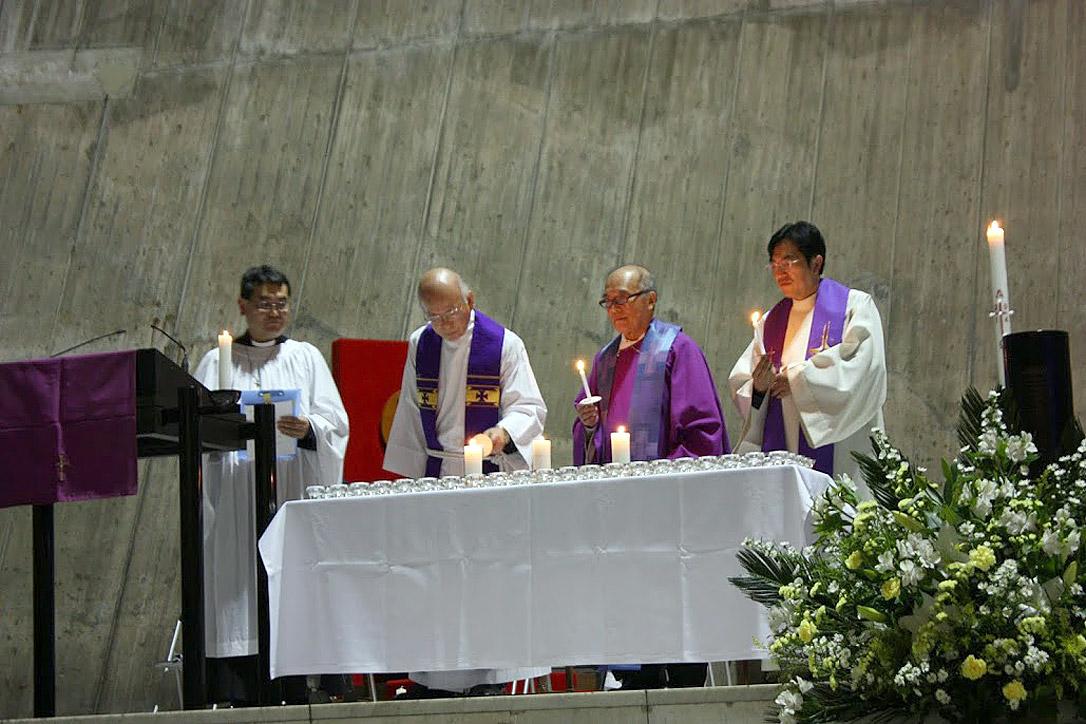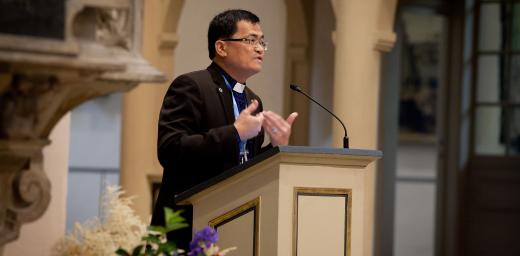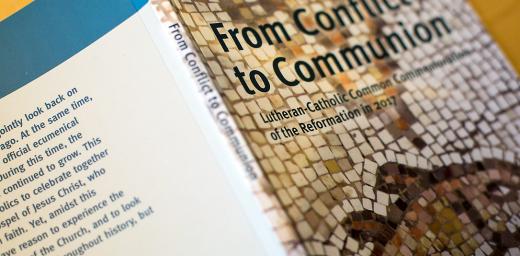A Growing Spirit of Ecumenism in Japan

Prof. H. Augustine Suzuki (second left) lights a candle at St Maryâs Cathedral in Tokyo, where Anglicans, Catholics and Lutherans held the first joint worship service. Photo: JELC
Interview with Lutheran Theologian Prof. Augustine Suzuki
(LWI) – Lutheran theologian Prof. H. Augustine Suzuki looks at how more than three decades of dialogue with Catholics has contributed to a growing spirit of ecumenism in Japan. “There is no doubt,” the two dialogue partners “will definitely” jointly commemorate the 500th anniversary of the Reformation in 2017, and the “involvement of other churches is hoped for,” says Suzuki in this interview with Lutheran World Information (LWI).
How would you describe the relationships between Lutherans and Catholics in Japan, including some of the activities that you carry out together?
There has been a dialogue committee between the two churches: The Ecumenism Committee between Catholics and Lutherans. This committee convenes twice a year. Early this year we had the 71st session, which means the two churches have had continued dialogue for the past 35 years. The main agenda at this session was how we would commemorate the 500th anniversary of the Reformation. There has been a general agreement that the two churches should have a joint commemoration event on or around 31 October 2017.
On 30 November 2014, the two churches, together with the Anglican Episcopal Church of Japan jointly held a Sunday worship service to commemorate the 50th anniversary of the Decree on Ecumenism issued by the Second Vatican Council. It was the very first worship service by the three churches in history. The liturgy booklet used for the worship at this event was prepared by a team of theologians and liturgists from the three churches.
About ten years ago, on 31 October 2004, Catholics and Lutherans held a joint worship service in the Marian Chapel of the Church of St Ignatius in Yotsuya, Tokyo, to celebrate the completion of the Japanese version of the Joint Declaration on the Doctrine of Justification. It was the very first joint worship service in history, between the two churches. The translation, which was done by a team of translators from the two churches, took almost five years to complete, mainly due to language difficulties, as the two churches use different words for major technical terms. Even the name of ‘our savior’ was different: Ies Kirist for Lutherans and other Protestants, Iezus Kirist for Catholics. There are a lot of other differences including proper nouns, names of places, and especially theological terms. The adjustments and readjustments went on and on until an agreement was reached.
Recently you produced a Japanese version of the publication From Conflict to Communion Lutheran-Catholic Common Commemoration of the Reformation in 2017, how was its translation process?
I was asked, as a member of the Lutheran-Roman Catholic Commission on Unity, to provide a first draft translation, which I started working on in the summer of 2013. I then submitted this draft to the Ecumenism Committee, which formed a team of translators from among its members, two from the Lutheran side and two from the Catholic counterpart. The team’s task was to polish my draft and present a final draft for approval. They started their work in mid-summer of 2014, completed a final draft by the end of that year, and the Japanese version of From Conflict to Communion was published in mid-February 2015. The team members are Prof. Dr Naozumi Eto, and Prof. Dr Motoo Ishii from the Lutheran side, and Prof. Dr Ichiro Mitsunobu, and Dr Junichi Iwamoto, from the Catholic side.
Does the Japanese version include any complementary texts?
Yes, at the beginning of the book, there are two ‘Recommendations’; one from the Tokyo Diocese Archbishop Peter Takeo Okada, who is also chairperson of the Bishops’ Conference of the Roman Catholic Church in Japan, and Rev. Tadahiro Tateyama, President of the Japan Evangelical Lutheran Church (JELC). The inclusion of these persons enhances the publication’s authority by showing that the content has been authorized by the authoritative bodies of the two churches.
The are two “prefaces” to the Japanese version, one by LWF General Secretary Rev. Martin Junge and the other by Kurt Cardinal Koch, President of the Vatican’s Pontifical Council for Promoting Christian Unity.
How will you distribute the publication From Conflict to Communion?
The publishing company first printed 1,000 copies, of which the Catholic Church purchased 300 copies, and our church 200, which we will distribute in our local churches. The remaining 500 copies will be distributed to Christian bookshops throughout Japan.
The 1,000 copies may sound too small a number, but this is not so. The Christian population in Japan is far less than one percent of the total population [nearly 127 million people], of which 50 percent is Catholic. The membership of our church would be somewhere between 3,000 and 4,000 nationwide, with 125 local congregations. The average attendance for Sunday worship is about 30. As the 500th anniversary draws near, demands for this book will increase and a second printing will be inevitable.
Will you commemorate the 500th Reformation anniversary together with the Catholics?
Yes, we definitely will. There is no doubt about it. One of the problems arising from the experiences of the three-church worship last year is the question: ‘Should the commemoration be limited to the Lutherans and Catholics? Should we invite other denominations to get somehow involved in this event?’ According to the spirit of ecumenism here, there is no doubt that the involvement of other churches is hoped for. The Ecumenism Committee will discuss these issues in the coming sessions.
As I pointed out, Christianity in this country is a minority of minorities. However, almost all Japanese know the name of Martin Luther and the short history of the Reformation from school textbooks that are regulated by the Ministry of Education in the Central Government. But the story of Christianity at the time of the Reformation usually ends here, and therefore the majority of Japanese still think the Catholics and Protestants, Lutherans in particular, are [still] enemies.
In such a context, a joint worship service would give a big impact to the non-Christian audience in Japan. Nation-wide newspapers, which usually pay no attention to Christianity in Japan, will probably cover the event. We, on the Lutheran side, hope that the joint commemoration would be a rather ‘big’ event, in view of the social impact it can give.
JELC member Prof. H. Augustine Suzuki, teaches at the Japan Lutheran Theological Seminary in Tokyo. He is a member of the Lutheran-Roman Catholic Commission on Unity which leads the bilateral dialogue between the LWF and Vatican globally. The Commission published From Conflict to Communion in June 2013, marking the first time the history of the Reformation has been written by both dialogue partners.





